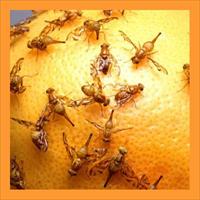AFRICA: Wiping out hunger— one fruit fly at a time

For years, farmers in one of Senegal’s most mango-rich zones, Keur Mbir Ndao, 80km east of the capital, were losing more than half their harvests. While some wrote it off to God’s wrath, researchers told them the cause was actually an Asian fruit fly, Bactrocera invadens, first discovered in Kenya in 2003.
According to the Nairobi-based International Centre of Insect Physiology & Ecology (ICIPE), if these flies are not controlled, they can wipe out crops and economies worldwide. Sunday Ekisi, the leader of the centre’s African Fruit Fly Program, told IRIN West Africa’s horticulture is particularly vulnerable: “The fragmented structure of fruit production, poor standards for phytosanitary management [agricultural goods crossing borders], poor management skills and lack of state and donor support makes eradication a difficult, if not impossible task.”
Ekisi said Africa-born flies can travel and endanger horticulture in other continents’ tropical regions.
In 2005, fruit flies ruined up to 40 percent of Africa’s two-million ton mango harvest, said Ekisi. “It is not just lost crops, but also loss of access to lucrative export markets abroad, which brings in much needed foreign exchange,” said Ekisi.
Three years later, Ekisi told IRIN, not much has improved:“The level of rejection [of African horticultural products] that has been witnessed the last two years as a result of Bactrocera invadens is enormous.”
Kenya is not able to export its mangos and avocados to several countries. Less Ugandan bananas are exported than before. Ghana’s citrus and avocados face the same fate. Ekisi estimated producers are losing 30-50 percent of their harvest value because of flies.
To tackle the problem requires a regional approach, but first, countries need to control the problem within their borders, said Ekisi.
Senegal
The president of Keur Mbir Ndao’s Cooperative of Fruit and Vegetable Producers, Ama dou Diakhate, told IRIN Senegalese farmers were close to giving up in 2005: “People did not know how to deal with these flies and were ready to cross their arms in defeat.”
In 2005, Senegalese farmers produced 60,000 metric tons of mangos valued at almost US$10 million, according to the Ministry of Agriculture. But flies helped cut short the planting season by a month, with the last mangos harvested by 15 August.
In a country where more than 25,000 are directly employed by the mango industry, fruit flies threaten not only fruit, but also livelihoods, said the business development advisor for the US-funded Economic Growth Program, Dr. Patrick Nugawela: “The mango industry has a wide spectrum of people depending on it, so mango flies affect everyone across the spectrum, from the producer to the exporter."
Starting in 2007, the program has worked with trade associations like Keur Mbir Ndao’s cooperative to fight back through a nationwide government led-Integrated Project to Control Fruit Flies.
In 2006 and 2007, producers had some relief with fruit fly interventions and the mangos lasted until the end of the rainy season in September. The extra month helped Senegalese farmers earn an extra US$5 million in mango money, according to export receipts.
In 2008, the Keur Mbir Ndao cooperative hired educators to show farmers that unkempt fields and rotting mangoes breed flies. They demonstrated how to attract the flies with things as simple as basil plants, and traps rigged with lady’s face cream or nutmeg- scents that attract the flies. They showed how neem oil, a natural vegetable oil, can control the flies.
Mangoes buffer price increases
Diakhate said the longer 2007 growing season helped some farmers in Keur Mbir Ndao buy an entire year’s worth of rice for their families at the end of the harvest: “If people didn’t have room to store the 50-kilo bags of rice, they would leave it at the store, and come by to pick up their rice supply monthly.”
Reflecting global price increases, the price of rice in Senegal has increased by 74 percent over the past two years, pushing members of some communities in the rice-dependent country into malnutrition, based on a July 2008 Ministry of Health report.
So far in 2008, farmers surveyed by the cooperative in Keur Mbir Ndao report, on average, an almost 70 percent increase in income over last year. Even so, Diakhate said people are not able to buy a year’s worth of rice as before. “We can afford to stock up only a few months. It is just too expensive now.”
And as of 7 October, Diakhate is still counting on producing more mangos. “We expect this harvest to last one more week.”
But he recognises the battle has not been won yet. “Not all mango growers are engaged in the fight. We are still losing about 15 percent of our harvest. We need to stay vigilant. The flies are smart. We have learned just how quickly they reproduce.”
And vigilance takes money, said ICIPE’s Ekisi: “Investment in fruit fly control can be enormous…it has to be a continuous process.”
 Back and Next - Back and Next
Back and Next - Back and Next See Also - See Also
See Also - See Also